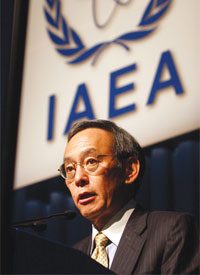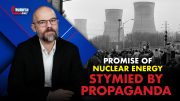
A few weeks ago, Energy Secretary Steven Chu surprised a National Public Radio interviewer with an unequivocal endorsement of nuclear power. In answer to a question about his choice of living near a coal-fired or a nuclear-powered plant where electricity is generated, he responded, “If you look at the difference between a coal plant down the river and a nuclear power plant, personally I’d rather be living near a nuclear power plant. There’s less of the pollution we know about that is dangerous. Nuclear power has a record in the United States that is very, very good.”
This isn’t supposed to be a position taken by a high government official. His answer prompted interviewer Steve Inskeep to tease him about possible neighbors who might not like the idea of living near such a power plant. Undeterred, he added to his non-politically correct stance by expressing the further belief that storage of nuclear waste is “less an issue.”
When nominated for Energy Secretary, Dr. Chu expressed a firm commitment to ending our nation’s addiction to foreign oil. How serious such a commitment is needed can be gauged from a few unimpeachable facts.
When informed that our nation was importing 30 percent of the oil we were using, President Jimmy Carter declared the “moral equivalent of war” to deal with the situation. (Use of the Carter phrase quickly went the way of the dodo bird when its initials were discovered to be MEOW.) But the Carter-led war began, and one of its early “victories” saw the creation of the federal Department of Energy. Thirty years and hundreds of billions of dollars later, the United States is importing 60 percent of our oil. And the Department of Energy continues to impede the use of the safest, cleanest, cheapest and most efficient method of generating electricity — nuclear power.
Anti-nuclear protestors were already a political nuisance in early 1979 when an accident in central Pennsylvania occurred at the Three Mile Island nuclear power station. No one died; no one was hurt at the site; and within a few days, touring the inside of the plant could have been safely undertaken by anyone. What happened at Three Mile Island demonstrated how safe nuclear power truly is. But not only was the plant shut down, its next door twin, where no accident had occurred, was also shut down. Nuclear power was immediately and intensely awarded an uncalled-for black eye by hysterical media experts and the nation’s leftist agitators who have always preferred shutting down our nation.
A few weeks after the March 28 accident, Dresser Industries paid for a remarkable two-page spread in the Wall Street Journal featuring an eye-catching quotation from noted physicist Dr. Edward Teller. In huge lettering, it stated, “I was the only victim of Three Mile Island.” Indeed, Dr. Teller was. He explained that, while working 20 hours per day to counter “the propaganda that Ralph Nader, Jane Fonda and their ilk are spewing … I suffered a heart attack.” He contended that nuclear power is a major part of solving the worldwide energy problem, a problem he labeled “the greatest present-day threat to the prosperity and survival of nations.”
Generating electricity from the atom’s energy is an American invention. But less than 20 percent of the electricity we consume is produced this way. Contrast that with France, where nuclear power generates 76 percent of the nation’s electricity. Belgium, Sweden, Switzerland, Spain, and Japan also employ this marvelous invention more than does our nation. South Korea and China have ambitious plans to follow the trend. But the United States remains tied down by bureaucratic impediments and a fright-peddling anti-nuclear minority.
The following facts need airing. Studies show that pollutants from burning coal and oil cause premature deaths. Evidence demonstrates that hundreds of birds fall victim to wind farms each year. More eagles have been killed by wind turbines than were lost in the famous Exxon Valdez oil spill off Alaska’s coasts. It is physically impossible for a nuclear power plant to explode like an atomic bomb. Moreover, unlike coal-fired plants, which have smokestacks emitting pollutants into the atmosphere, nuclear power plants (which have cooling towers that emit water vapor) keep the waste contained within the plant itself. And there is relatively little waste because relatively little uranium is used, compared to other fuels, for the amount of energy produced. And nuclear waste disposal is a political problem, not a problem for science.
After 50 years of using this technology, it can be said without hesitation that nuclear power is far safer than fossil-fuel-fired plants in every conceivable way: accidents, environmental damage, health effects, long-term risk, you name it. So, like a breath of fresh air, we welcome the assessment of Dr. Steven Chu and hope that his sensible and scientifically reasonable attitude can triumph before America’s lights go out — politically and in every other way.



